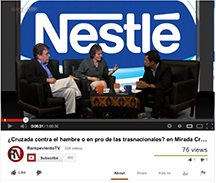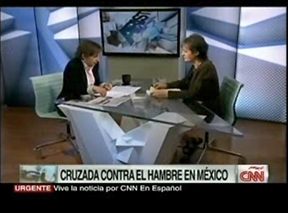Media coverage of Mexico's Crusade against Hunger
Media coverage of Mexico's Crusade against Hunger -
Nestle and Pepsi's Poison Chalice
 Mexican webTV
Mexican webTV
CLICK HERE for Hector Javier Sanchez's interview Dr Marcus Arana and myself on Rompe Viento TV. (parts in Spanish May 3rd 2013)
CLICK HERE for IBFAN's Press Release on line
CLICK HERE for PDF
CLICK HERE for BMJ Nestlé and PepsiCo will give nutritional advice to women in anti-hunger campaign in Mexico 16 April 2013 (see text below)
 CNNCLICK HERE for PDF Reforma 10.4.13. (This article explains that PepsiCo's will create a milk product for pregnant and nursing women and Nestlé will run courses for women on the business of selling desserts).
CNNCLICK HERE for PDF Reforma 10.4.13. (This article explains that PepsiCo's will create a milk product for pregnant and nursing women and Nestlé will run courses for women on the business of selling desserts).
CLICK HERE for ENGLISH translation of Reforma
CLICK HERE for Proceso
CLICK HERE for Proceso in ENGLISH
CLICK HERE for links to over 40 other articles.
CLICK HERE for article in Reforma (11.4.13)with response from Rosario Robles, Secretary of Social Development in Mexico. (Spanish) and Marcelo Melchior, president of Nestlé Mexico
CLICK HERE for excerpts in English
CLICK HERE for article in Institute of Agriculture and Trade Policies. Tollhouse tortillas won’t end hunger
CLICK Here for the Cartoon that appeared in La Journada 11..13 which has Secretary Robles dressed as Marie Antoinette saying: Are you Hungry? Have a Pepsi.
USEFUL LINKS
CLICK HERE for Recommendations from a Pan American Health Organization Expert Consultation on the Marketing of Food and Non-Alcoholic Beverages to Children in the Americas (2011) regarding moving forward on WHO's official recommendations on Marketing to Children. (www.paho.org/sde/healthyeating)
CLICK HERE for “Improve the food security of farming families affected by volatile food prices” Healthy Food, Healthy Child, FAO EU Food Facility Project in Cambodia to improve dietary diversity and family feeding practices.
http://www.youtube.com/watch?v=0rUX6F7ieVY
http://www.jornada.unam.mx/2013/02/16/delcampo.html
Tenexatlajco:pontodepartida
Nestlé and PepsiCo will give nutritional advice to women in anti-hunger campaign in Mexico
BMJ 2013; 346 doi: http://dx.doi.org/10.1136/bmj.f2458 (Published 16 April 2013)
Cite this as: BMJ 2013;346:f2458
Nestlé and PepsiCo will give nutritional advice to women in anti-hunger campaign in Mexico
BMJ 2013; 346 doi: http://dx.doi.org/10.1136/bmj.f2458 (Published 16 April 2013) Cite this as: BMJ 2013;346:f2458
Sophie Arie
Campaigners have warned that a project to reduce hunger in Mexico is being hijacked by food multinationals such as Nestlé and PepsiCo, which have signed agreements to provide nutritional advice and products to some of the country’s poorest women.
Under the agreements Nestlé is to teach 15 000 women in 12 of the country’s poorest states how to cook desserts and how to run a small business selling them. The project, called “My sweet business,” will also include half a day of education on nutrition and basic supplies to help the women set up the businesses.
PepsiCo is working with its local partner Quaker to develop a special nutritional milk for pregnant and breastfeeding mothers and a high nutrition biscuit for children aged under 5 years who have problems of malnutrition.
The companies Walmart, 7 Eleven, and Kmart are also reported to be signing agreements to join the Mexican government’s project, which launched in January and is called the National Crusade against Hunger. The Mexican government said that 11 000 people died from malnutrition in 2011 and that a quarter of the country’s 115 million people have some kind of nutritional deficiency.
Mexican consumer groups have sounded the alarm over potential conflicts of interest, and some media reports have challenged the government’s strategy. One cartoon in the newspaper La Jornada pictured the secretary for social development, Rosario Robles, as Marie Antoinette, saying, “Are you hungry? Drink Pepsi.”
The International Baby Food Action Network has warned that Nestlé’s initiative would “in effect, subsidize and facilitate the penetration of Nestlé products into the Mexican market, under the perfect cover of philanthropy.” One local newspaper reported that under the agreement Nestlé would be allowed to supply all its products to a network of 25 000 government run shops that stock basic food items in rural areas, though the BMJ was not able to confirm this report as it went to press.
Patti Rundall, who co-chairs the network, told the BMJ, “These partnerships mean the Mexican government is handing over nutritional education and knowledge to the corporations.”
International marketing conventions meant that Nestlé should not be in direct contact with mothers, Rundall said. “These 15 000 women going round selling puddings will be agents for Nestlé,” she added.
PepsiCo’s nutritional milk for mothers could undermine breast feeding by making women think that their milk was not good enough, she said.
Robles has defended the partnerships with multinationals in the Mexican media, saying that they would benefit thousands of people and that the government would have overall control.
Nestlé, which describes itself as a “leading nutrition, health, and wellbeing company,” told the BMJ that its aim was to help families eat better and said that the women it helped to set up businesses selling desserts would be free to use any brand of ingredients. It did not confirm whether the agreement would also allow the company to reach more people with its own products.
Johannes Evenblij, director of Quaker Mexico, which is developing high nutrition products for PepsiCo, told local media that the products should be available by the end of the year and that efforts would be made to make prices “accessible.”
United Nations conventions designed to control aggressive marketing say that food companies selling baby milk and other infant food products should not have direct contact with mothers.
In a recent report on the lifesaving potential of breast feeding (http://bit.ly/119AhTk) the charity Save the Children criticised several companies that sell baby milk substitutes, including Nestlé, and called for greater controls on marketing practices.
Nestlé insisted that it abided by international marketing conventions.
Notes
Cite this as: BMJ 2013;346:f2458
| Attachment | Size |
|---|---|
| bmj.f2458.full_.pdf | 141.96 KB |
- Login to post comments






